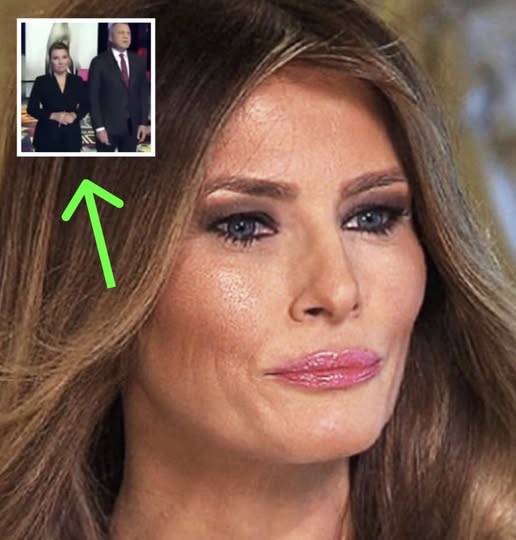
Melania Trump’s Modeling Past Resurfaces on Russian State Television, Sparking Debate
In late 2024, a controversial broadcast on Russian state television reignited discussion about Melania Trump’s modeling career and her role as a public figure. During a political segment on the widely watched program 60 Minutes, hosts Yevgeny Popov and Olga Skabeyeva discussed Donald Trump’s successful 2024 presidential campaign and surprised viewers by displaying images from Melania Trump’s modeling days, including photos from her 2000 GQ magazine spread.
The broadcast quickly drew international attention. Julia Davis, founder of the Russia Media Monitor watchdog group, shared clips of the segment on X (formerly Twitter), noting its unusual tone. “Meanwhile in Russia: this is how the most watched state TV channel in the country welcomed Melania Trump’s upcoming return to the White House,” Davis wrote, pointing out that one of the anchors appeared amused during the broadcast.
As the photos were shown, Popov narrated segments of Melania Trump’s modeling history, remarking that with her husband returning to the White House, she too was preparing for a new chapter in the public eye. He referred specifically to her GQ cover from 2000, which featured her posing on fur and included other stylized images from the same shoot. Skabeyeva, seated beside him, struggled to contain her laughter, which only added to the controversy surrounding the segment.
For context, Melania Trump began her modeling career in Europe as a teenager. Born in Slovenia, she was discovered at age 16 by photographer Stane Jerko. Soon after, she signed with an Italian modeling agency and went on to work in Milan and Paris before moving to New York in the mid-1990s. Over the following decade, she built a successful career working with several well-known fashion houses and magazines. Her 2000 GQ cover became one of her most recognizable shoots and later resurfaced during her husband’s 2016 presidential campaign, drawing widespread media attention at the time.
At the time of that original photoshoot, Dylan Jones, editor of GQ UK, noted that interest in featuring Melania was exceptionally high. According to Jones, Donald Trump himself requested a framed copy of the cover to display in his office. While the images sparked headlines during the campaign, Melania Trump publicly stood by her modeling work, framing it as a celebration of fashion and art.
That defense continued years later. In 2023, Melania addressed renewed commentary about her past in a short video posted to X, emphasizing her pride in her career choices. “Why do I stand proudly behind my nude modeling work?” she asked rhetorically. “The real question is why the media feels the need to critique my celebration of the human form in a fashion shoot.” She drew parallels between her photos and centuries of art that highlighted the human body as a natural subject of expression.
The Russian broadcast revived that debate, not only about Melania’s modeling career but also about how political figures and their spouses are portrayed internationally. For some observers, the decision to show the images on a major state-run channel seemed like an attempt to highlight cultural contrasts between Russia and the United States, or to make a pointed statement about the spectacle of American politics. Others viewed it simply as an attention-grabbing move designed to draw viewers.
Regardless of the intent, the segment has sparked broader conversations about privacy, media ethics, and how past work—particularly in the modeling and entertainment industries—continues to follow individuals once they step into political life. While many defended Melania’s right to embrace her modeling career as part of her professional history, others questioned whether showcasing those images on state television in a political context crossed a line.
As Melania Trump prepares for a return to the public stage with her husband’s second presidency, the broadcast is a reminder of how her past continues to be reframed in political narratives. For supporters, it underscores her confidence and independence. For critics, it highlights the persistent tension between personal history and public duty in the modern media age.
Adding another dimension to the discussion, Melania Trump released her memoir in October 2024, just weeks before the Russian broadcast. The book includes previously unseen photos and stories from her life before, during, and after her modeling career. Promotional material for the memoir emphasized her perspective on balancing individuality with the expectations of being a First Lady, promising readers an intimate look at experiences she had largely kept private.
In the end, the controversy surrounding the Russian broadcast illustrates how public figures remain subject to interpretations that extend far beyond their own control. What was once simply part of a fashion career is now repeatedly reframed through the lens of politics, culture, and international media.
Melania Trump herself has made her position clear: she does not regret her past work, nor does she see it as incompatible with her role in public life. “The human body has always been a subject for art,” she said in 2023. “Fashion photography is simply one of the modern forms of that expression.”
As the world adjusts to Donald Trump’s return to office, Melania Trump once again finds herself at the center of both admiration and controversy. Whether viewed as an empowered professional or as a political figure under scrutiny, her story highlights the complicated ways in which women’s pasts are remembered, reshaped, and sometimes weaponized in the public arena.
